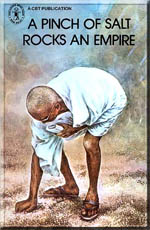
P.O. SEVAGRAM, DIST.WARDHA 442102, MS, INDIA. Phone: 91-7152-284753
FOUNDED BY MAHATMA GANDHI IN 1936
A Pinch of Salt Rocks An Empire
Children's Book : on Dandi March - Salt March

A PINCH OF SALT ROCKS AN EMPIRE
Compiled & Edited by : Sarojini Sinha
Table of Contents
- Map of March Route
- Chapter-1
- Chapter-2
- Chapter-3
- Chapter-4
- Chapter-5
- Chapter-6
- Chapter-7
- Chapter-8
- Chapter-9
- Chapter-10
- Chapter-11
- Chapter-12
- Chapter-13
About This Book
Compiled & Edited by : Sarojini Sinha
Illustration by : : Mrinal Mitra
First Published :1985
I.S.B.N :81-7011-291-5
Published by :Children's Book Trust
Printed at : Indraprastha Press
Nehru House,
4 Bahadur Shah Zafar Marg,
New Delhi,
India
Navajivan Mudranalaya,
Ahemadabad-380014
India.
© CBT, 1985
Download
Chapter - 13
Gandhiji reached Bombay on December 28. A large cheering crowd received him. He said sadly, "I have come back empty-handed, but I have not compromised the honour of my country."
Gandhiji found that Lord Willingdon, who had replaced Lord Irwin, and the new Government in Britain were determined to destroy India's recently won sense of freedom. Lord Willingdon withdrew the concessions made earlier and imposed drastic restrictions on the Indian National Congress.
Jawaharlal Nehru was arrested while going to Bombay to welcome Gandhiji. Emergency ordinances were introduced to deal with the non-rent campaign in U. P., the North-West Frontier Province and Bengal and to arrest and detain without trial those suspected of being agitators. The Government also imposed restrictions on the press and assumed powers to seize buildings, property and bank balances.
Gandhiji remarked to a Bombay audience. "These are all Christmas gifts from Lord Willington, our Christian Viceroy."
Speaking to the Welfare of India League, Gandhiji said, "I am not conscious of a single experience throughout my three months' stay in England and Europe that made me feel that after all East is East and West is West. On the contrary, I have been convinced more than ever that human nature is much the same, no matter under what clime it flourishes, and that if you approached people with trust and affection you would have ten fold trust and thousand fold affection returned to you."
The British government, he explained, was friendly to him and "we parted as the best of friends... But when I come here I find a different order of things altogether."
Gandhiji sent a telegram to the Viceroy condemning the ordinances and the arrests and suggesting an interview. The Viceroy's secretary replied that Congress activities against the Government made the ordinances necessary. Lord Willingdon refused to meet Gandhiji.
On January 4, 1932, Gandhiji was arrested, again under Regulation XXV of 1827. As before, he was taken to the Yeravda Central Jail.
A short time ago, he had been His Majesty's guest at Buckingham Palace. Now he was His Majesty's guest in the Yeravda Central Jail. The Government again started a policy of repression and important leaders of the freedom movement were arrested and imprisoned.
In January fourteen thousand and eight hundred people were sent to jail for political reasons. In February seventeen thousand and eight hundred.
Were the Salt Satyagraha and all the sacrifices made by thousands of men and women in vain?
Not, if one understands Gandhiji's reasons for starting the Salt Satyagraha. He had said that the object of the civil disobedience movement was two-fold. The repeal of the Salt Tax and the "repeal of the British bondage of which the Salt Tax is but an offshoot."
The true purpose was even deeper. Civil disobedience, Gandhiji had said, "is the method whereby the nation is to generate the strength to reach her formulated goal" - namely, independence.
And that strength had been achieved. The Indian people had realized their power and the British Empire its weakness.
Though Britain continued to rule India for some more years, a great change had taken place. And that was to affect not only India, but also Britain.
Rabindranath Tagore described this change: "Europe has completely lost her former moral prestige in Asia...For Europe, this is in actual fact, a great moral defeat that has happened. Even though Asia is still physically weak and unable to protect herself...nevertheless she can now afford to look down on Europe where before she looked up."
The days of not only British but all European Colonialism were numbered. Seventeen years after Gandhiji launched the Salt Satyagraha, India was free. And it was not long before most of the colonies ruled by European countries in Asia and Africa were also free.
Gandhiji had shown that even an unarmed people could win against the mightiest countries if their cause was just and they were prepared to face their masters with courage and fortitude.
The 'law-breakers' who stood on the sea shore at Dandi that day in 1930 achieved much more than Indian independence.